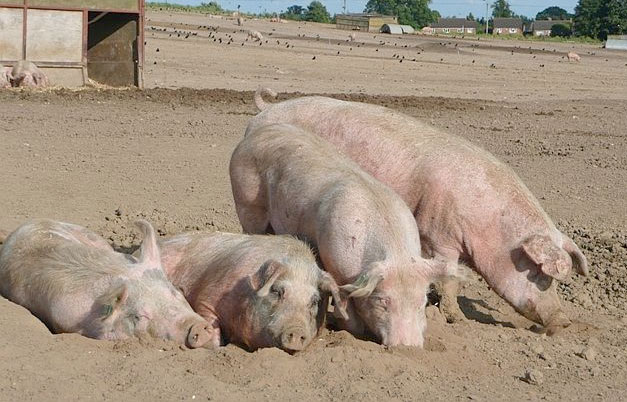
One hundred of the UK's leading food firms have pledged total traceability for the imported pork products they sell after concerns were raised by farm groups over EU failures to police pig welfare standards.
The National Pig Association's Wall of Fame pledge states that all pork products sourced from farms are compliant with the EU directive responsible for laying down minimum standards in pig welfare.
It is illegal to confine pregnant pigs in "stalls" for most of their adult lives, but most countries on the continent are in breach of this European Union Welfare Directive.
"The response to our campaign for traceable higher-welfare pork for British consumers has been outstanding — far, far better than we ever envisaged," said NPA chairman Richard Longthorp.
NPA called on Britain's major food companies, including retailers, to check their supply lines forensically, and to boycott all pork and pork products from illegally-operated continental farms.
According to recent data from Brussels, over 60 percent of European Union countries are failing to comply with new animal welfare rules and pregnant sows are still being confined in narrow individual cages known as "stalls" for most of their lives.
"The response was slow to start with but then 'Horsegate' erupted and food companies suddenly realised how vital it is that they know exactly where the raw materials they import come from," said NPA general manager Dr Zoe Davies.
"It is clear from the responses we have had that these companies have taken our challenge very seriously and on behalf of British consumers we thank them for their responsible stance."
The National Farmers' Union and Compassion in World Farming recently highlighted a lapse or failure to comply with the EU directive. The NFU used a European advisory meeting to challenge Commission officials on their 'ongoing failures' to police pig and poultry rules across Europe.
The NFU took part in the Egg and Poultrymeat Advisory Meeting in Brussels where representatives from the Commission's Food and Veterinary Office (FVO) and its Animal Welfare Unit were questioned on the poor progress on inspections to verify Member States that are compliant with the ban on conventional laying cages (introduced in January 2012) and the partial ban on sow stalls.
"Bins full of dead pigs being eaten by maggots; piglets lying in their own filth; pregnant sows kept in sow stalls, so narrow that they cannot even turn around: this is a horrific reality check" Compassion in World Farming said.
Stalls have not been used in the UK for many years, but figures released by Brussels show 80% of EU countries have not yet complied with the ban.
"This is against the law which requires that fattening pigs must be given straw or other natural manipulable material. All of the fattening pigs seen on the 9 farms had their tails docked, and may well have been subject to other painful and routine mutilations such as castration and teeth cutting" Compassion in World Farming CEO Philip Lymbery said.
While the UK met both deadlines, the failure of many Member States to introduce these pieces of legislation on time has been well documented.
"It remains a huge disappointment to producers that the Commission has yet to inspect or start to impose penalties on those Member States who are still producing eggs or pigmeat from systems now deemed illegal. That places our producers at a competitive disadvantage" the NFU said.
Speaking after attending the meeting, NFU Scotland’s policy manager for pigs and poultry, Peter Loggie said: "The Commission's attitude towards inspection and enforcement of these important pieces of welfare legislation remains lamentable and fails to ensure that all producers across Europe are abiding by the same set of rules."
The NPA is confident that the pledges on its Wall of Fame have helped reduce the flow of pork from illegally-operated farms. It is now calling on all European countries to clean up their act and comply with European Union welfare legislation.
"British consumers can be confident that most of the pork and pork products on British supermarket shelves is traceable and is produced to the high welfare standards they expect," said Richard Longthorp.
"British pig farmers have, of course, exceeded European welfare requirements for many years, and British pork is traceable back to its farm of origin."
"We will continue to accept pledges for our Wall of Fame and will shortly start to conduct supply-line audits to check the pledges are being honoured. But overall we are extremely satisfied with the progress that has been made so far."
At the beginning of the year NPA estimated as many as 40,000 pigs an hour were being delivered to continental processing plants from illegally-operated pig farms. As Britain imports around 60 percent of its processed pork it was feared that many British consumers were unwittingly supporting the trade in illegally-farmed pigs.
